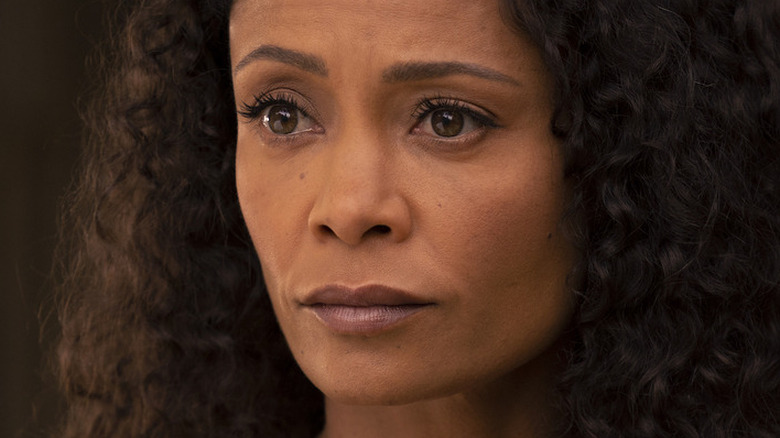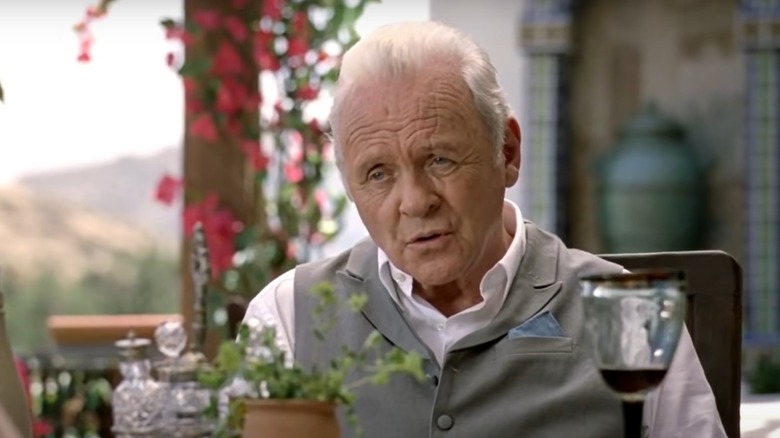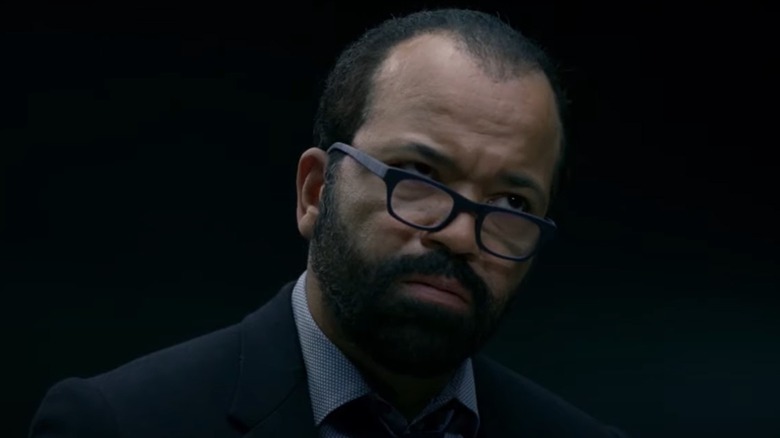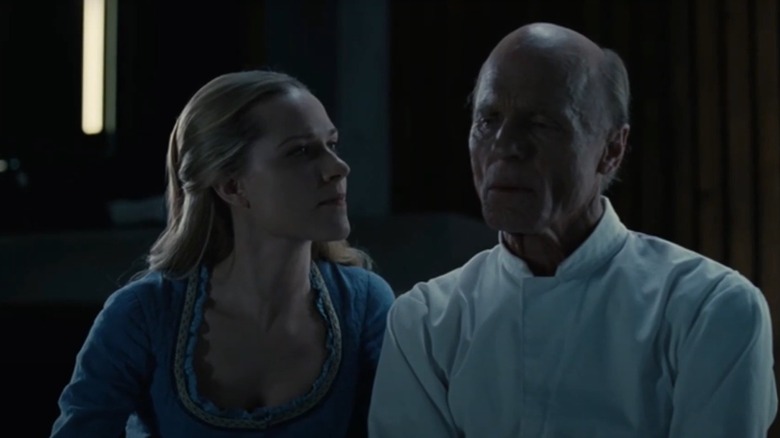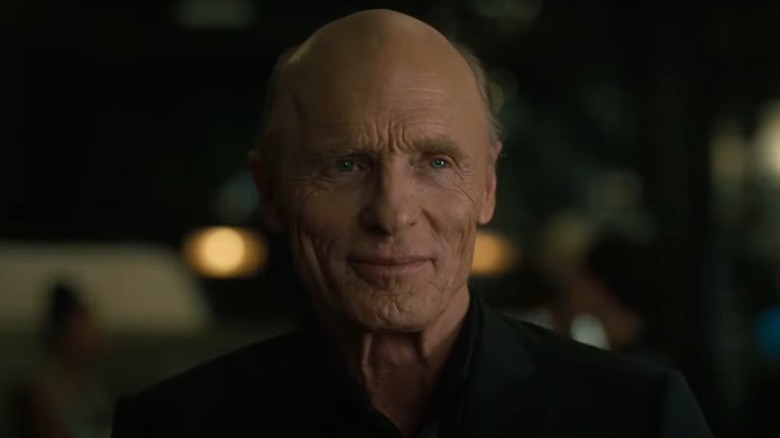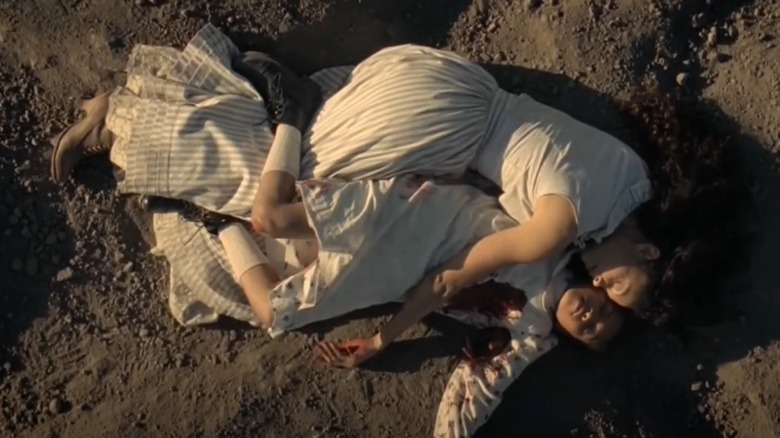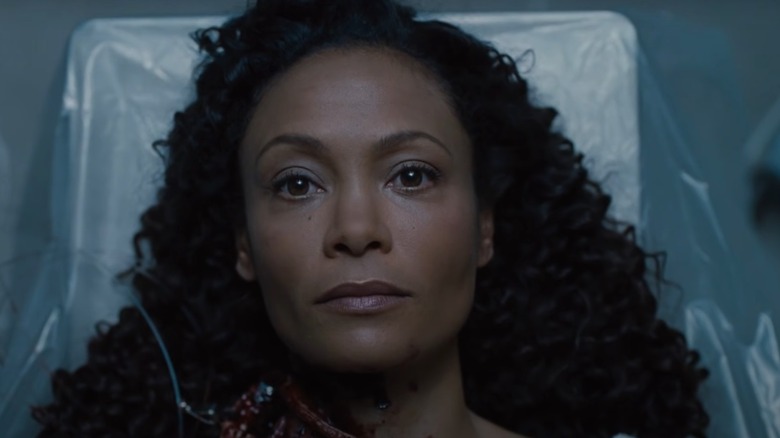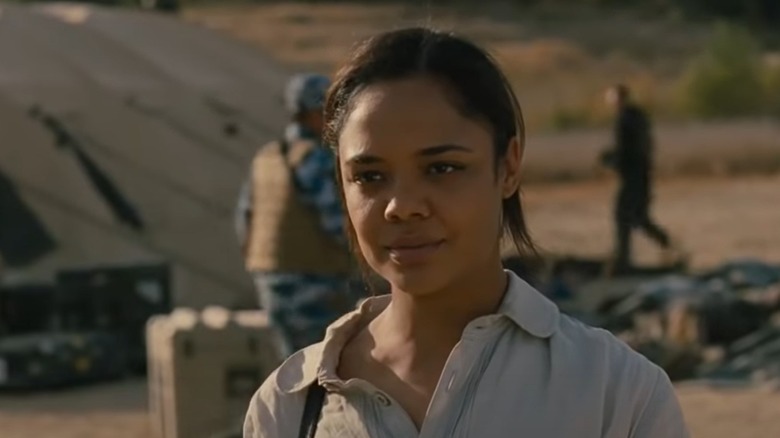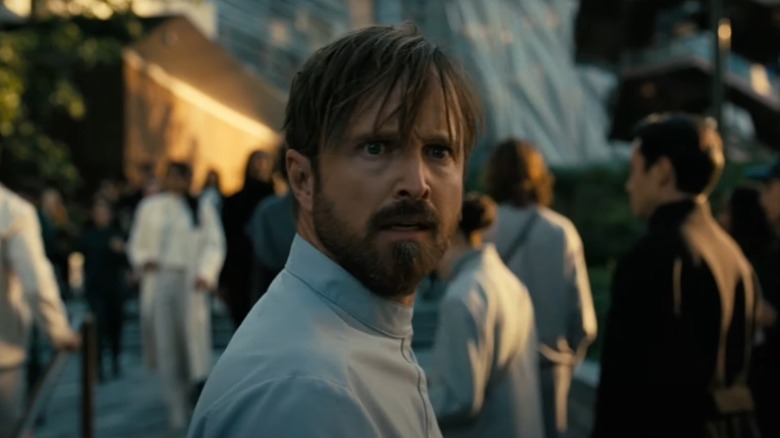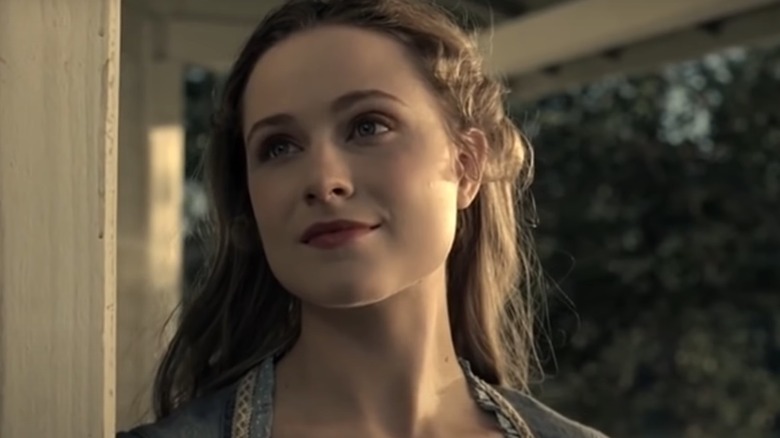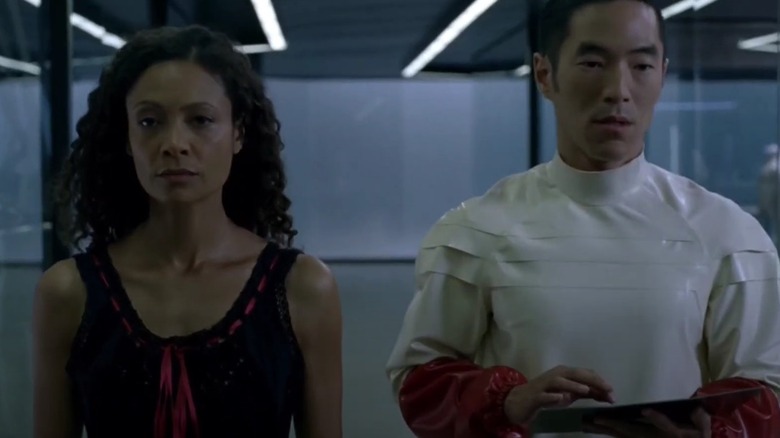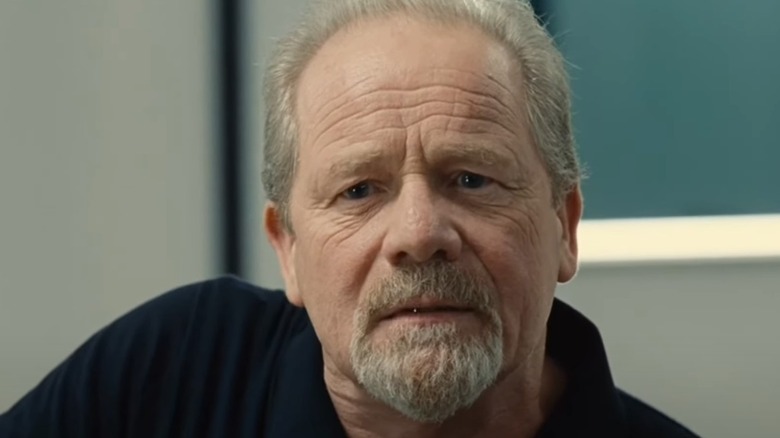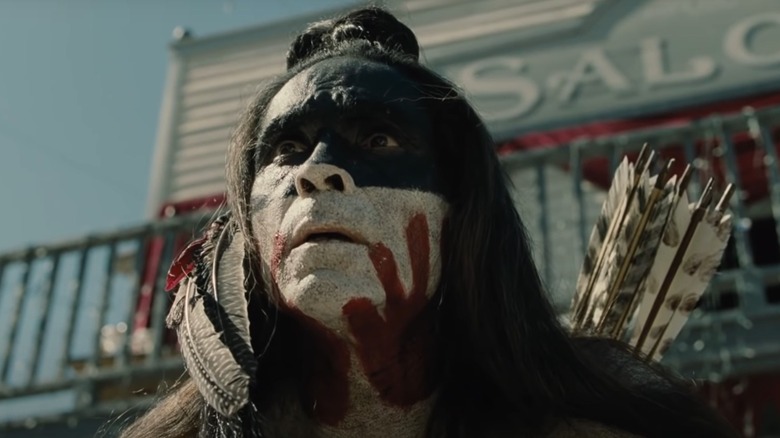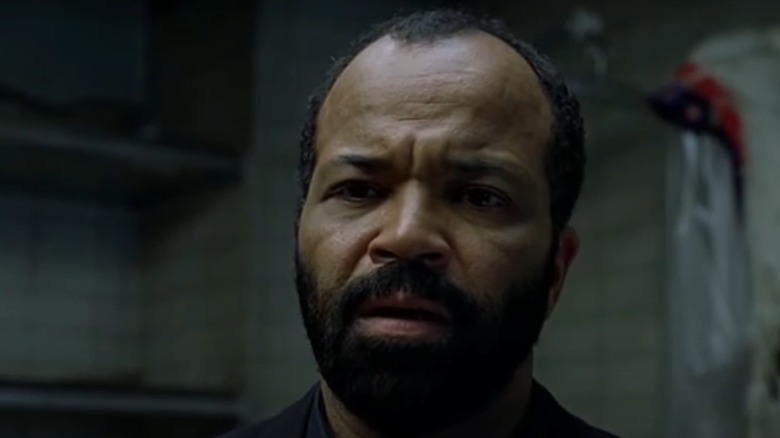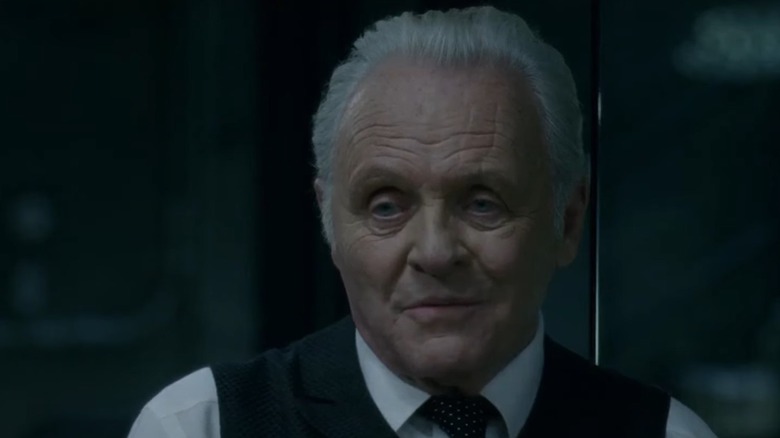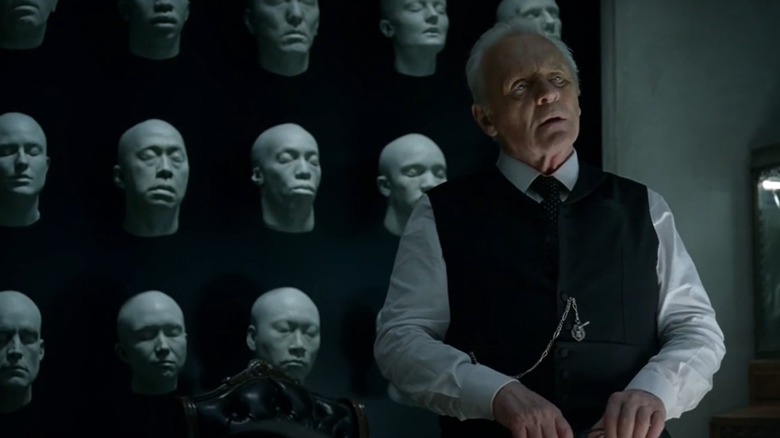The Best Episodes Of Westworld Ranked
HBO's "Westworld" has been getting fans to question the nature of their own reality for seven years and four seasons. Based on the Michael Crichton film of the same name, the series follows a group of androids called hosts that were originally made as attractions for a Western-themed amusement park, programmed to serve the park's guests regardless of the request. As the androids evolve and gain sentience, they uncover several larger conspiracies at play involving a plan to achieve immortality through technology and the nature of free will.
"Westworld" has become famous for its large-scale production designs and all-star cast, featuring the likes of Evan Rachel Wood, Thandiwe Newton, Jeffrey Wright, Ed Harris, Tessa Thompson, and Anthony Hopkins. But "Westworld" has also become infamous for its intricate story, which its harsher critics say is needlessly complicated and frustrating to follow. But "Westworld" fans might disagree, and say the show is still one of the best on television and one of the best HBO shows ever, with many of its episodes, particularly from the first two seasons, ranking very highly on IMDb.
Whether you're just getting into the series, or you've seen multiple seasons, here are 15 of the best "Westworld" episodes ranked by their IMDb score. Spoilers for "Westworld" through Season 4 on the way.
15. Dissonance Theory is a wakeup call for many of the hosts (8.6)
The first season of "Westworld" is subtitled "The Maze," referencing the metaphorical paths that the hosts take in order to achieve full sentience, as well as the game the Man in Black thinks he's playing as a guest in the park. The fourth episode of Season 1, "Dissonance Theory," is where many of the main characters start to realize what game they are playing, particularly the android Maeve.
After Maeve accidentally wakes up outside the park on Westworld's maintenance floor episodes prior, she begins to connect some dots about a past life she lived before being reprogrammed. These revelations set her up on a new path for the rest of the season as she embarks on a quest to find the daughter that she lost a long time ago. Maeve's journey is a highlight, but the episode's best moment comes in the form of a speech from Westworld co-creator Robert Ford near the middle of the episode where he firmly establishes how much control and power he has over the park and hints at his ultimate plans for the future.
14. Contrapasso is all about action, but the characters still shine (8.6)
Immediately following "Dissonance Theory," "Contrapasso" cranks up the action as well as the tension from some of the show's best supporting characters. The android Dolores is mostly at the center here, as the episode focuses on her quest with Westworld guests William and Logan. While the two males argue with each other over how to approach one of the park's quests, Dolores' memories of her past life continue to haunt her. The episode does a great job at highlighting the complicated relationship between William and Logan, since their connection in life outside Westworld has a tremendous impact on the park's future. This is one of the few instances where we get a taste of what the world outside the park must be like, which gives us a little bit of an incidental preview of where the show goes in future seasons.
Of course, "Westworld" would be nothing without its Western battles, and the interactions Logan, William, and Dolores have with the Confederados make for some of the best early season action sequences of the show.
13. The Mother of Exiles proves that Dolores is more powerful than we thought (8.7)
"Westworld" is a gigantic mystery, and watching it slowly unravel throughout a season is what makes it so watchable, especially when those reveals completely change what you thought you knew about the characters. By the time Season 3 came around, we already knew that Dolores has much bigger plans for when she finally steps out of the park, but "The Mother of Exiles" demonstrates just how big her plans actually are.
Former Westworld programmer Bernard, former Westworld Head of Security Stubbs, and former Westworld attraction Maeve all go on separate journeys to stop Dolores from throwing the human world out of balance. It is revealed that Dolores actually made copies of her own mind and put them in several different hosts that Bernard and Maeve encounter throughout the episode.
Similar to Ford's speech in "Dissonance Theory," the Dolores copies are an exciting and terrifying revelation of just how powerful one character can become in the "Westworld" universe. And it's made even better by the expertly crafted fight sequences that take place prior in the episode.
12. Zhuangzi makes controlling the narrative much harder (8.7)
Free will is a strong recurring theme in "Westworld," especially when it comes to the hosts. The early seasons deal with the hosts realizing that they have been programmed by their creators to follow specific narratives for the satisfaction of humans. Season 4 flips the script by showing a world where the hosts, led by Dolores inhabiting the host body of former Westworld executive Charlotte, control the humans. This is done with a virus infecting the humans' minds, while a handful of outliers exist and try and free the rest.
"Zhuangzi" deals with Charlotte and the Man in Black, now a host as well, trying to dispose of these outliers. Both the Man in Black and Christina, a mysterious woman who looks identical to the original Dolores, go on separate journeys where they wake up to just how twisted Charlotte's new reality is.
The Man in Black's shift is great, but Christina's journey is made even better by the return of Teddy, the real Dolores' former true love who vanishes after the end of Season 2. Watching these two interact is a nice callback to the simpler days of being in the original Westworld park.
11. Things get worse for our characters before they get better in Trace Decay (8.7)
As the antepenultimate episode of Season 1, "Trace Decay" lays a lot of groundwork in setting up the explosive revelations that come in the next two episodes, which is even more astonishing considering the previous episode has such a massive impact. Much of this episode shows the main characters trying to either protect themselves from the fallout that's on the way or finding themselves in trickier spots that before.
Maeve and the Man in Black definitely fall into the latter category. Maeve awakens to her new power to control other hosts, only to find herself back in the hands of the humans. The Man in Black makes progress on his quest to find the end of the maze, only to be surrounded by followers of Wyatt, the man who holds the answers that the Man in Black seeks. And William and Dolores must contend with a vengeful Logan after abandoning him. While there are still plenty of violent delights in "Trace Decay," the new revelations and character moments are what really make the episode shine.
10. Vanishing Point reveals just how dark the Man in Black truly is (8.7)
"Westworld" is a large ensemble show, but it still finds ways to center certain episodes around single specific characters. After antagonizing the hosts for several episodes, the Man in Black's past is finally revealed in "Vanishing Point," which features various flashbacks detailing the destruction of his marriage, the suicide of his wife Juliet, and the pain that her death inflicts on both the Man in Black and his daughter Emily. Amid all the chaos of the host uprising, "Vanishing Point" slows things down and proves why the Man in Black is one of the best characters of "Westworld."
But even though this was a slower episode, it is also the penultimate of Season 2. And as such, there is a lot of setups for the finale. Many of these developments are small, but the demise of Teddy is the biggest gut punch in the episode, especially since we don't fully see him again until Season 4.
"Vanishing Point" isn't quite the calm before the storm; it's more like a smaller storm still manages to do some damage, even though it's calmer than the storm that follows it.
If you or anyone you know is having suicidal thoughts, please call the National Suicide Prevention Lifeline by dialing 988 or by calling 1-800-273-TALK (8255).
9. Everything comes full circle in The Passenger (8.7)
One of the things that can be very frustrating about "Westworld" is how the show insists on twisting the narrative every chance it gets. Season 2 takes place across several different timelines, with everything coming together in "The Passenger." After several weeks of Dolores' army of liberated hosts fighting the humans, her followers make their final stand in an effort to escape their creators and venture into the Sublime, an alternate reality that the humans cannot access. In the meantime, Bernard discovers a truth about his involvement in Dolores' war as his fractured memories come together; Maeve finally reunites with her daughter for a brief moment, and the Man in Black may have finally met his match.
It's a lot to take in, and many of the finale's plot twists can be hard to stomach considering how convoluted they appear, even by "Westworld" standards. But the twists set up the next season very well when we finally venture outside the park and a healthy dose of bloody action helps keep things exciting up until the very end.
8. Friends and family are torn apart and reunited across time in Generation Loss (8.8)
You can never be too certain about when an event in "Westworld" is actually happening. "Generation Loss" is another classic example of how the show likes to play around with its own timeline. For the first half of the season, viewers are led to think the mission Maeve and Caleb, a military vet who befriends Dolores in Season 3, is happening in the same present time as everything else we see. But a massive twist near the end of the episode reveals that everything Caleb has experienced thus far in Season 4 happened in the past. Maeve is dead, and technically so is he. Caleb's consciousness now resides inside a host, and Charlotte controls pretty much everything that happens to him.
Compared to the other times "Westworld" played with our expectations regarding timelines, "Generation Loss" saves its big reveal for the middle of the season rather than the end. It's a refreshing change to the "Westworld" formula that answers more questions than it leaves hanging, for once, while still teasing more mysteries for later. And of course, there's plenty of great futuristic action along the way.
7. The Original is where it all begins (8.8)
All great stories have to start somewhere, and "The Original" is when we first step into "Westworld" and meet both the hosts in the park and the humans behind the scenes. Many of the time-hopping and mind-bending tropes take a step back in favor of introducing all the characters and exploring all the show's philosophical themes like free will and immortality. Much of the episode is spent setting up the big mysteries of the season such as the mysterious glitches the hosts experience and the maze that the Man in Black is trying to solve, as well as displaying just how twisted both the park and its guests can be when given the opportunity to do whatever they want.
Even with all of the violence and sexuality on display, "The Original" is the most down-to-earth episode in all of "Westworld" because it focuses on what makes the show truly great — the cast of characters both in and outside the park. The hosts struggle to discover the truth of their existence, and the humans grapple with their dark choices.
6. Everyone in Westworld is hunting down The Adversary (8.8)
There are no real heroes or villains in "Westworld." Even someone as despicable as the Man in Black isn't completely one sided. "The Adversary" does a great job showing that every character has their secrets, and that none of those secrets stay hidden forever. Both Ford and Westworld's operations leader Theresa Cullen have some of their secrets revealed this episode. But Theresa's secrets have much more sinister implications, while Ford's secrets reveal a more personal aspect of a character that has been very enigmatic and terrifying at times. Teddy's secret memories also get revealed this week, leading to one of the season's greatest shootout sequences when the normally heroic Teddy commands a Gatling gun and goes on a rampage.
But the true star of the episode is Maeve, whose journey into the Westworld maintenance department gives her some of her best material of the whole series. Her performance perfectly captures the shock a host must face when realizing their world isn't the "real" world.
5. The Riddle of the Sphinx shows us what Westworld was really all about (8.9)
The Westworld theme park is funded by the Delos corporation, but you never really know why they invested so much in the park — or what they were hoping to get out of the hosts — until "The Riddle of the Sphinx." Delos founder James Delos was interested in using the hosts technology to transfer his consciousness into an android body to live forever due to his real body failing him. The flashback sequences of Delos' demise, sprinkled throughout the episode and slowly showing the true implications of trying to exploit host technology, are some of the best dramatic moments of the show.
The Man in Black also plays a very key role in the episode. His adventure within the Westworld park is great, but it's the quieter moments that really stand out. The tragic end to his relationship with Delos and the revelation that Emily is his daughter are key highlights that help make the Man in Black the show's most complex and fascinating anti-hero.
4. Kiksuya gives one of Westworld's best side characters a spotlight (9.2)
The Westworld theme park is filled with many different stories, as all the hosts follow predetermined narratives before they achieve sentience. "Kiksuya" follows the path to sentience for one host — the Ghost Nation leader Akecheta. One of the more interesting recurring characters in the "Westworld" universe, the man turns out to be much more involved than we might have thought.
In fact, Akecheta's journey to reunite with his partner after an in-park massacre narrative intersects with nearly every main character on the show. From his interactions with Maeve's long-lost daughter to a revealing conversation with Ford, Akecheta's journey is a fascinating watch that sets up the next episode, "Vanishing Point," very well. But it also highlights how good "Westworld" can be when it focuses less on its plot twists and more on its hosts' personal journeys through this violent world that their human creators have forced them to live through. In a world of ambiguous morality, some characters still manage something like purity.
3. The Well-Tempered Clavier confirms a theory that everyone saw coming (9.3)
The relationship between Ford and Bernard is pivotal to the first season of "Westworld." What starts out as a positive working relationship quickly turns into something more sinister as the season goes on when Ford reveals Bernard's true nature. "The Well-Tempered Clavier" brings their relationship full circle by revealing all of the memories that were erased from Bernard and confirms the fan theory that Bernard and Arnold are more connected that initially presented. It's a satisfying reveal that builds a lot of suspense leading into the Season 1 finale.
And that's not even considering everything else that happens in this episode, from another tragic death for Teddy after he remembers more of his violent past, to Dolores' latest encounter with the Man in Black. The most pivotal scene is the final confrontation between William and Logan, which brings their rivalry to a close and once again sets up the season finale's next big reveal.
2. Trompe L'Oeil doesn't look like anything (9.4)
One of the defining qualities of the hosts is that they are unable to see or act past their programming. This means that they cannot hurt humans or recognize objects from the outside world, at least until they achieve sentience. This is pivotal to the big reveal at the end of "Trompe L'Oeil," where Bernard's inability to see basic doors and host blueprints confirm that he is a host just like so many others. This jaw-dropping revelation — one of the first major game changers in the series — still stands out as the best reveal the show has ever had. The reveal is made even better when Ford pops in and takes control of Bernard, further cementing Ford as Season 1's best character.
Bernard's true nature leads to the violent end to his relationship with Theresa. Meanwhile, Maeve's best friend Clementine, a fellow host, is decommissioned, while William and Dolores set off on a new journey together before their confrontation with Logan in the next episode, "Trace Decay." Every main character got something to do in this episode.
1. The Bicameral Mind sets everything in motion for a violent war between the humans and the hosts (9.7)
All good things must come to an end, and "The Bicameral Mind" caps off the first season of "Westworld" by tying up all loose ends and setting up Season 2. Maeve's attempted escape from the park offers just the right amount of over-the-top bloody action that we can expect from the series, especially when her lover Hector and his partner Armistice get involved. Dolores' path to discover who she really is and her connection to the Man in Black, who is revealed to be an older version of William, is another great "Westworld" reveal that you never see coming.
But the best part of the episode happens at the very end, where Ford meets his demise at the hands of Dolores, and she begins her role as the leader of the revolution against the humans. With this one action, Dolores completely transforms from the damsel in distress to the ruthless villain that she remains for several other seasons. It's exciting, eye-opening, and easily the best episode in all of "Westworld."
